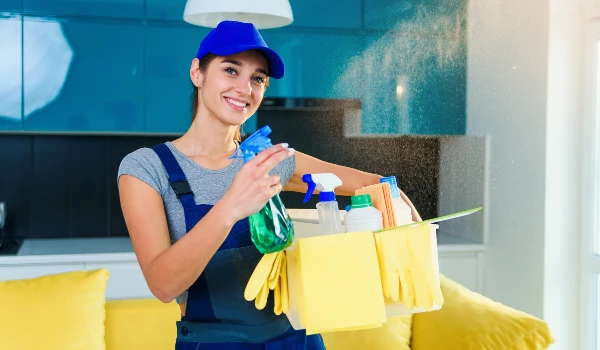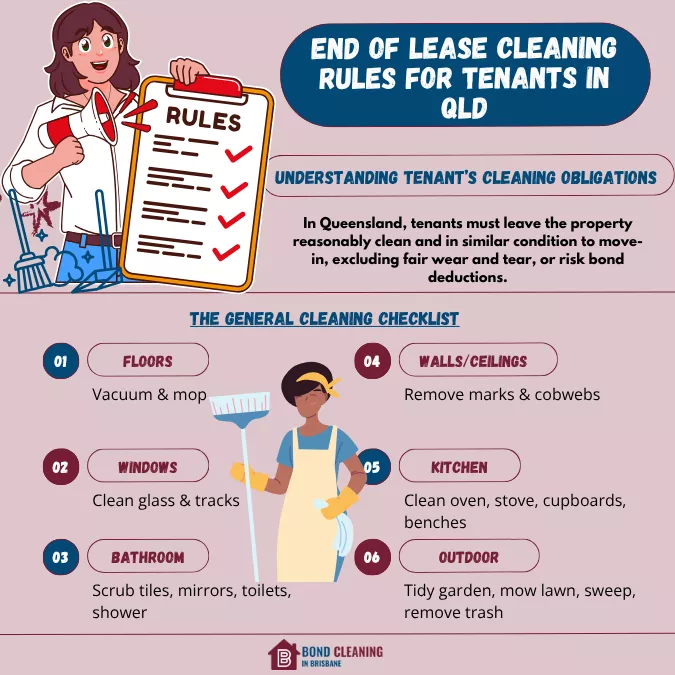End of Lease Cleaning Rules in Queensland: A Tenant’s Quick Guide
Ever heard of tenants losing their bond over a smudge on the wall or dust on the blinds? You might be thinking: “No. That surely doesn’t happen.” Unfortunately, this happens more often than you think. Queensland’s end of lease cleaning rules are quite strict and sometimes pretty confusing, too. Landlords and property agents expect the property to be returned in exactly the same condition as when you first moved in (minus fair wear and tear). This means everything from the oven to the window tracks in all the rooms are going to be under scrutiny, so you need to prepare for it accordingly.
This quick guide will break down exactly what is expected of an end of lease clean in Queensland and help you move out with confidence. Another aim is to help secure your bond money. Whether you decide to tackle this task yourself or bring in professionals, understanding these standards will help keep stress and missteps at bay. For those of you living in cities, hiring the help of expert bond cleaning Brisbane can help expedite the process while ensuring inspection standards are met.
1. Understanding Tenant’s Cleaning Obligations
Under the Residential Tenancies and Rooming Accommodation Act 2008, tenants in Queensland must leave the property “reasonably clean” and in a similar condition to the start of the tenancy, excluding fair wear and tear. The property doesn’t need to be spotless or professionally cleaned, just clean enough to satisfy a reasonable landlord.
Fair wear and tear refers to the natural deterioration that occurs over time, like faded paint or minor carpet thinning. However, stains, mould, pet hair or dirt accumulation, are not normal wear. Failing to clean properly, may lead your landlord to use part of your bond for quality bond cleaning Brisbane services.
2. The General Cleaning Checklist
A comprehensive checklist should be reviewed before returning the keys in order to avoid any misunderstandings. The usual expectation is:
- Floors: Vacuum and mop all hard surfaces, removing stains and scuff marks.
- Walls and Ceilings: Clean the hooks of dirt, cobwebs or marks.
- Windows: Clean all of the glass, including the flyscreens and tracks, if you can.
- Kitchen: Degrease the oven, clean stove tops, exhaust fans, cupboards and benches.
- Bathroom: Scrub tiles, grout, shower screens, mirrors, toilets and exhaust fans.
- Bedrooms and Living Areas: Dust blinds, fans, skirting boards and light fittings.
- Outdoor Areas: Mow the lawn, clean the gardens, sweep the balconies, and get rid of trash.
Following a systematic approach ensures no corner is overlooked and can help avoid cleaning disputes after the inspection.
3. When Professional Cleaning Is Required?

Although hiring experts is not always necessary, there are circumstances in which, it is highly advised or even mandated by your lease agreement. For example, if the carpets were professionally cleaned before moving in, they should be cleaned again when you depart.
Similarly, if you’ve had pets on the premises, you are required to carry out a flea treatment and professional carpet cleaning. Landlords can request receipts as proof. Here, it’s very advantageous to work with a reputable bond cleaning Brisbane company. These cleaners frequently provide free reclean guarantees, if necessary, and are knowledgeable with RTA requirements, and what inspectors look for.
4. How to Avoid Bond Disputes?
Tenants and landlords have differing ideas, about what constitutes “reasonably clean” which leads to the majority of bond disputes. The best defence against this is to keep lines of communication open and documentation clear. Always fill out the Entry Condition Report with pictures, demonstrating the condition of the property before moving in. This acts as proof of, already existing damage or stains.
When moving out, complete the Exit Condition Report in the same manner. You will have documentation to back up your claims of fulfilling your responsibilities in the event that your landlord has complaints regarding cleanliness. Additionally, the RTA’s dispute resolution service can assist in mediating the situation if problems escalate.
5. Common Mistakes Tenants Make
Even sincere renters may overlook minor but essential details which can result in deductions. Among the most frequent errors are:
- Leaving marks or residue on walls from adhesive hooks or tape.
- Forgetting hidden spots like behind doors, under sinks or in light fittings.
- Overlooking outdoor areas, including bins and garden beds.
- Disregarding filters or air vents which over time gather dust.
- Failing to keep cleaning receipts when professional services are used.
By taking the time to confirm these, future disagreements and needless claims can be avoided.
6. What to Do If Your Landlord Isn’t Satisfied?
Before granting your bond refund, your landlord might ask for additional cleaning, if they think the current cleanliness of the place is inadequate. It is best to react promptly and professionally in these situations. Request detailed feedback and, if necessary, call in a cleaner to address any problems.
If you disagree with the landlord’s assessment, you’re entitled to apply to the RTA for bond dispute resolution. They’ll review the reports, evidence and communication, from both sides to make a fair decision.
Infographic: Tenants Guide to QLDs End of lease Cleaning Rules

Wrapping Up
Although end of lease cleaning may seem like a tiresome last step, it doesn’t have to be a difficult experience if you prepare ahead of time and are aware of Queensland’s regulations. The goal is to return the property in a clean, presentable state that corresponds, to your entry condition report. A thorough, structured strategy guarantees an easier transfer. Happy Cleaning!


